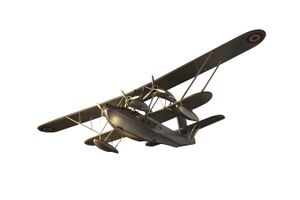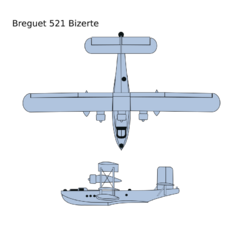Engineering:Bréguet 521 Bizerte
| Bréguet 521 Bizerte | |
|---|---|

| |
| Model of a Breguet 521. On display at the Musée national de la Marine, Paris. | |
| Role | Flying boat |
| Manufacturer | Breguet |
| First flight | 11 September 1933 |
| Introduction | 1935 |
| Primary users | French Navy / Vichy French Navy Luftwaffe |
| Number built | 37 |
| Developed from | Short S.8 Calcutta |
The Bréguet 521 Bizerte was a long-range military reconnaissance flying boat built by the France aviation company Breguet.
Development
A biplane of all-metal construction, with three engines mounted in nacelles between the upper and lower wings, the aircraft was a development of the Breguet S.8/2 Calcutta, which itself was a militarised licensed version of the British Short S.8 Calcutta. It was built to meet a French Navy specification for a long-range flying boat issued in 1932, competing against proposals from Latécoère (the 582), Lioré et Olivier (the unbuilt LeO H42) and Loire Aviation (the Loire 70). The first prototype made its maiden flight on 11 September 1933, with it being purchased, and an order placed for two more on 4 January 1934.[1][2]
A series of small orders for production Bizertes was placed, starting with an order for three in 1934, with the last order, for 12 (nine of which were later cancelled) being placed in September 1939.[1] In total, 37 Bizertes were built, with the last three not being completed until after the French surrender in June 1940.[2]
In 1935 a civilian version – the Breguet Br.530 Saigon – was produced.
Operational history
After the first flight in September 1933, 37 aircraft were produced, which served with five squadrons of the French Navy from 1935 until 1940. Two squadrons remained in service with the Vichy Navy after the armistice, at Berre in Southern France and Karouba in Tunisia, with six aircraft each.[1][2] The German Luftwaffe purchased a number of Bizertes for its Seenotdienst (Air-Sea Rescue) service in 1940, which (in addition to the three undelivered Bizertes[2]) it used to equip a squadron based at Brest on the French Atlantic coast.[2] When Vichy France was occupied by the Germans following the Allied invasion of North Africa in November 1942, the remaining Vichy Bizertes were taken over by the Luftwaffe, allowing further Seenotdienst units to be established at Biscarrosse and Berre.[2] Following the Allied Invasion of Southern France in August 1944, one of the Luftwaffe Bizertes was discovered by French forces and used for communications duties until spares ran out.[1]
Variants
- Breguet 521.01
- Prototype, powered by three Gnome-Rhône 14Kdrs 14-cylinder two-row radial engines
- Breguet 521 Bizerte
- Long-range flying boat, powered by three Gnome-Rhône 14Kirs 14-cylinder two-row radial engines or three Gnome-Rhône 14N radial engines.
- Breguet 522
- Re-engined version of Breguet 521. Three 670 kW (900 hp) Hispano-Suiza 14AA radial engines. One built.[2]
- Breguet 530 Saigon
- Civil version of the Breguet 521. Three Hispano-Suiza 12Ybr liquid-cooled inlines. Two built.[3]
Operators
 France
France
- Aviation Navale
- Air France operated the two Br.530s from 1935[4]
 Germany
Germany
- Luftwaffe
Specifications (Br.521)
Data from Warplanes of the Second World War. Vol. 5. Flying Boats,[1] The encyclopedia of military aircraft[5]
General characteristics
- Crew: 8
- Length: 20.48 m (67 ft 2 in)
- Wingspan: 35.18 m (115 ft 5 in)
- Height: 7.5 m (24 ft 7 in)
- Wing area: 162.6 m2 (1,750 sq ft)
- Empty weight: 9,470 kg (20,878 lb)
- Gross weight: 15,091 kg (33,271 lb)
- Max takeoff weight: 16,600 kg (36,597 lb)
- Fuel capacity: 5,250.7 L (1,387 US gal; 1,155 imp gal)
- Powerplant: 3 × Gnome-Rhône 14Kirs1 14-cylinder two-row air-cooled radial piston engine, 670 kW (900 hp) each
- Propellers: 3-bladed variable-pitch propellers
Performance
- Maximum speed: 243 km/h (151 mph, 131 kn) at 1,000 m (3,300 ft)
- Cruise speed: 164 km/h (102 mph, 89 kn) economical cruise
- Normal Cruising speed 199 km/h (124 mph; 107 kn)
- Range: 2,100 km (1,300 mi, 1,100 nmi) at normal cruise at 1,000 m (3,300 ft)
- Maximum range: at economical cruise 3,000 km (1,900 mi; 1,600 nmi)
- Service ceiling: 6,000 m (19,685 ft)
- Time to altitude: 2,000 m (6,600 ft) in 8 min 46 sec; 3,000 m (9,800 ft) in 14 min 30 sec
- Wing loading: 90.2 kg/m2 (18.5 lb/sq ft)
- Power/mass: 0.137 kW/kg (0.083 hp/lb)
Armament
- Guns: 5 × 7.5 mm (0.295 in) Darne machine guns
- Bombs: 4 × 75 kg (165 lb) bombs underwing
See also
Related development
Related lists
- List of aircraft of World War II
- List of military aircraft of France
- List of flying boats and floatplanes
References
- ↑ Jump up to: 1.0 1.1 1.2 1.3 1.4 Green, William (1962). Warplanes of the Second World War. v. 5.. London: Macdonald. pp. 6–9. ISBN 0356014495.
- ↑ Jump up to: 2.0 2.1 2.2 2.3 2.4 2.5 2.6 Passingham, Malcolm (March–April 2000). "From Calcutta to Bizerte: The Breguet 521 Flying Boat". Air Enthusiast (86): 56–61. ISSN 0143-5450.
- ↑ Donald, David (1997). The encyclopedia of world aircraft (Updated ed.). Blitz Editions. p. 189. ISBN 1-85605-375-X.
- ↑ Nicolaou, 1996, p.82
- ↑ Jackson, Robert (2002). The encyclopedia of military aircraft. Parragon Pub. ISBN 0-7525-8130-9. https://archive.org/details/encyclopediaofmi0000jack.
Bibliography
- Bousquet, Gérard (August 1985). "Le Breguet Bizerte dans la Luftwaffe" (in fr). Le Fana de l'Aviation (189): 17–22. ISSN 0757-4169.
- Bousquet, Gérard (2013). French Flying Boats of WW II. Sandomierz, Poland: Stratus. ISBN 978-83-63678-06-7.
- Lacaze, Henri (2016) (in fr). Les avions Louis Breguet Paris. 2: le règne du monoplan. Le Vigen, France. ISBN 978-2-914017-89-3.
- Nicolaou, Stéphane (1996). Flying Boats & Seaplanes: A History from 1905. Devon, UK: Bay View Books. p. 82. ISBN 978-1901432206. https://books.google.com/books?id=Hs4Ni-w7RO0C&q=%22air%20france%22%20aircraft%20%22breguet%20530%22%20-pinterest&pg=PA7.
External links
- "Br-521 Bizerte". French Fleet Air Arm. 2011. http://www.ffaa.net/seaplanes/bizerte/bizerte.htm.
 |



